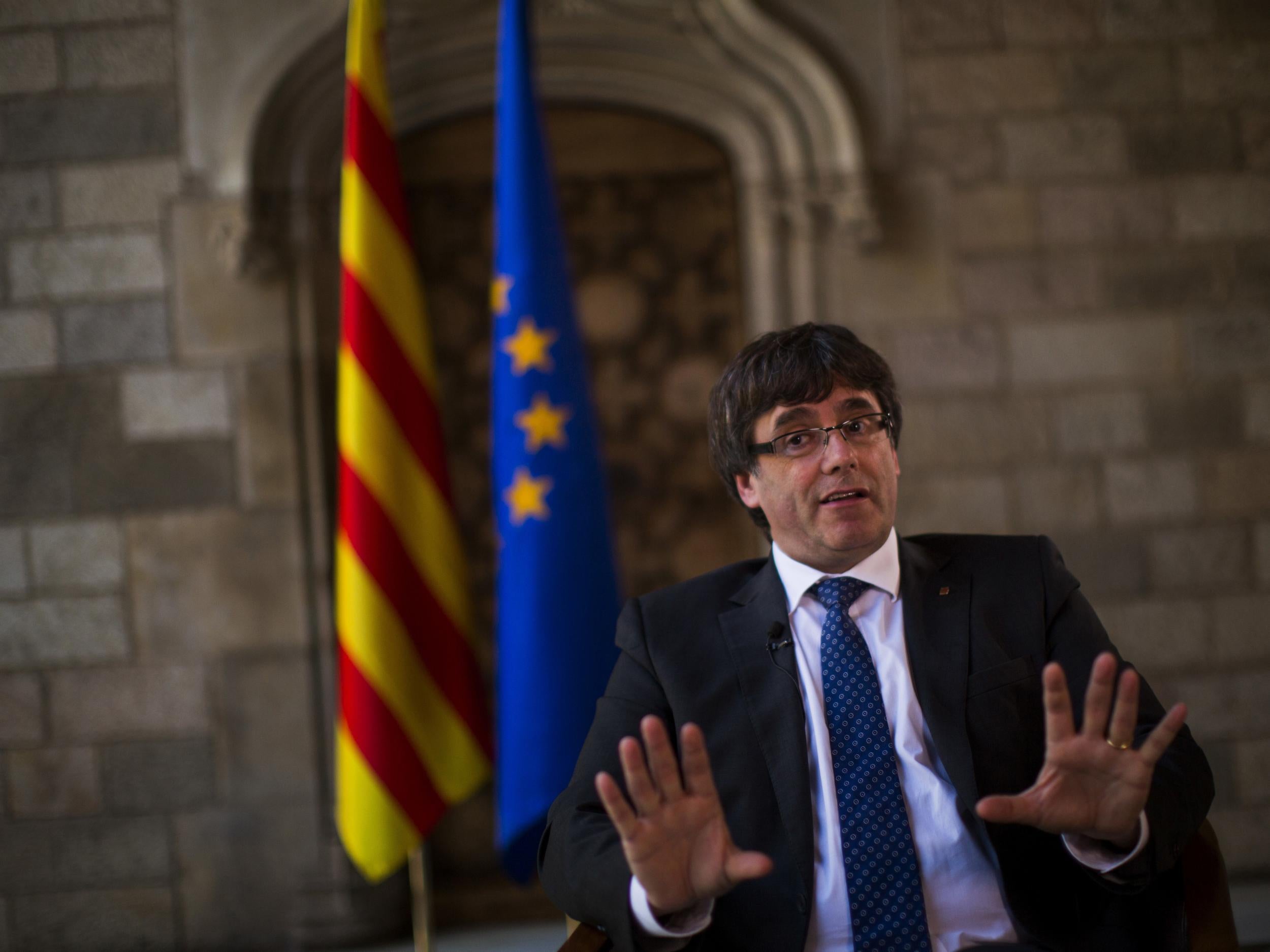Spain's crackdown on Catalonia independence movement only boosting its support, says regional president
Vote will allow Europe to 'hear voice of Catalonia in a very loud and strong way'

Spain's crackdown on Catalonia's controversial independence referendum is only boosting support for the vote, the regional president has said.
Vowing to turn the domestic dispute into a European affair, Catalan leader Carles Puigdemont accused the European Commission of having “deaf ears” so far to Catalonia's desire to hold a poll.
Mr Puigdemont criticised the Commission for failing to defend Catalans against controversial measures adopted by the Spanish courts and central authorities to try to stop the vote.
No country, within or outside the European Union, has openly expressed support for the 1 October referendum that Spain's conservative government sees as illegal.
“They are very brave when they talk about other countries where they have no competencies, but where are they when we citizens need them?” he said of EU officials in an interview four days before the secession referendum. “Is Europe's solution to Catalans to turn its back?”
“If the yes wins, I will make an appeal for the European community to become involved, because we will have won our right to be heard, something that hasn't happened until now because the European Commission has always turned a deaf ear (to Catalonia),” the 54-year-old separatist leader said.
Sunday's vote, Mr Puigdemont said, will allow Europe to “hear the voice of Catalonia in a very loud and strong way".
“Whoever doesn't want to hear our voice needs to see a political otolaryngologist,” Mr Puigdemont said, using the formal term for an ear, nose and throat specialist.
He added that if European Commission President Jean Claude-Juncker cannot grasp the determination in Catalonia, “then it's because this (European) project is in bad hands".
Spain's Constitutional Court, which has previously ruled that only central authorities can call such a vote and that all Spanish nationals should vote on sovereignty matters, has suspended the referendum.
The pro-independence regional government has so far ignored court rulings and vowed to go ahead with the vote. Officials of the executive and legislative branches are under investigation and a heavy police presence has been assembled in the northeastern region as the day for Catalans to cast ballots nears.
Madrid has launched an unprecedented crackdown to stop the referendum, including seizing paper ballots, removing referendum propaganda and ordering schools to be sealed off so they can't be used as voting stations.
“Today we are closer to a massive (turnout for the) referendum than we were one month ago,” he said, describing the crackdown measures as “apocalyptic".
On Wednesday, Spain's National Court said it planned to investigate possible sedition charges for demonstrators who took part in a massive protest last week against a police crackdown on preparations for the vote.
“Looking at this landscape, somebody could think that we are hoarding weapons of mass destruction in Catalonia, a nuclear arsenal or a world-class drug stash,” Mr Puigdemont said. “But in fact, we are just trying to hold a referendum.”
He said that people in Catalonia that saw the referendum with indifference or hostility have now “seen the curtailing of freedoms as an offence to their democratic convictions".
Regional leaders have said that if the “yes” side wins, they would be ready to declare Catalonia's independence two days later regardless of voter turnout. But Mr Puigdemont on Wednesday acknowledged that significant participation is needed to portray the vote as representative.
He refused to disclose what percentage of the 5.5 million Catalan voters his government needs to declare the vote valid, but cited previous referendums in Spain, including the 2005 vote to pass the European Constitution that had a turnout of 42 per cent.
“Nobody raised concerns about the participation level in order to legitimate the results, so I hope there are also no concerns in this case,” Mr Puigdemont said.
Catalonia is one of Spain's 17 autonomous regions. Its capital is the Mediterranean port city of Barcelona.
With a population of 7.5 million inhabitants, its own cultural traditions and language, Catalonia contributes a fifth of the Spain's 1.1 trillion-euro economy (£877bn).
The vast majority of Catalans favour holding a referendum, but they have long been almost evenly split over independence itself.
Separatist sentiment peaked at the height of the 2008 financial crisis, with many Catalans feeling they could do better on their own, but with the national and regional economies thriving again, polls indicate support for secession is on the wane.
The region's first attempts to hold a non-binding referendum in 2014 were blocked by Spain's Constitutional Court. The Catalan government went ahead and staged the unofficial poll. About 2.3 million Catalans — less than half of those eligible — voted, with 80 per cent favouring independence.
Associated Press contributed to this report
Join our commenting forum
Join thought-provoking conversations, follow other Independent readers and see their replies
Comments